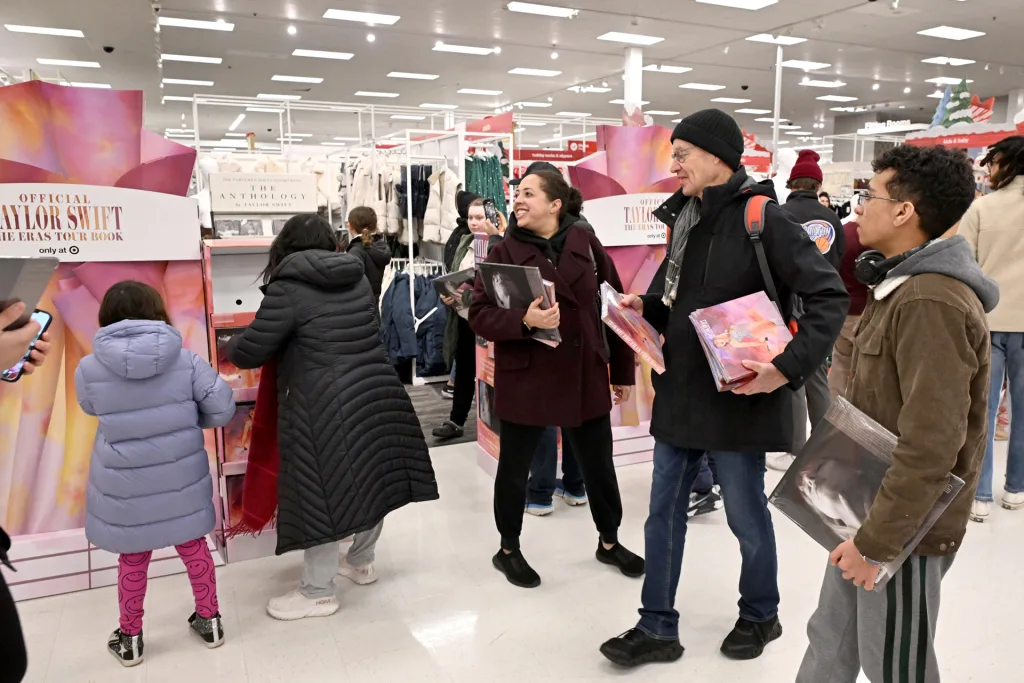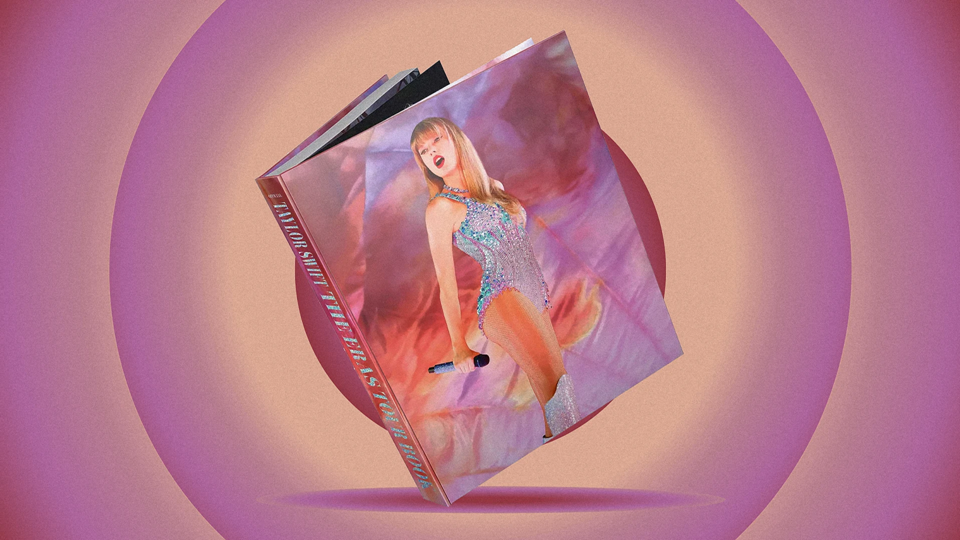Taylor Swift might just save Target’s Christmas
More Black Friday shoppers have been buying online, but this year they actually showed up at Target—thanks to Taylor Swift.
BY Rob Walker
Branded is a weekly column devoted to the intersection of marketing, business, design, and culture.
As the Taylor Swift “Eras” era approaches its finale, the impact of the Swifty Economy is showing no weakness. The pop juggernaut’s last feat, in fact, may be saving Target’s holiday season: Fans lined up at the store on Black Friday to snap up new vinyl and CD versions of her latest album, as well as The Eras Tour Book, available exclusively through the big-box retailer; the $40 coffee-table volume sold out in stores. Throw in online sales that kicked in after Black Friday, and the book sold a reported 814,000 print copies in its first week.
In even-better news for Target—which recently saw its stock swoon after a disappointing third quarter, the chain enjoyed a significant bump in foot traffic: up 16.8% over Black Friday in 2023, according to Placer.ai, which tracks and analyzes mobile device location data. By comparison, many retailers saw Black Friday foot traffic fall. It was down 3.1% at Walmart, 7.1% at Home Depot, and 20.8% at Best Buy (whose recent ad campaign actually touted shopping from home as an alternative to Black Friday deal treks).
While Target offered plenty of Black Friday bargains, the Swift merch was “probably the catalyst” for the turnout, says R.J. Hottovy, Placer.ai’s head of analytical research. Its data has previously shown a “Taylor Swift Visit Lift” in cities on her lengthy tour, played out in upticks in everything from tailgating events to craft store foot traffic.

As Hottovy acknowledges, foot traffic doesn’t automatically equal sales, especially not in-store sales. (Target did not respond to an inquiry from Fast Company about a specific Swift effect on overall sales.) But whatever the longer-term impact of Target’s Taylor exclusive on the chain’s overall performance, it helps fill in a more nuanced picture of how Black Friday shopping continues to evolve—as both a crucial long weekend for retailers and a cultural event.
Needless to say, online shopping and the rise of Cyber Monday bargains have for many years chipped away at the urgency of showing up on Black Friday. The New York Times recently offered anecdotal evidence that lining up early for “doorbuster” deals no longer has the same allure as the holiday retail-bargain season has become more diffuse. “I guess we are a little nostalgic for the fun we used to have on Black Friday,” one shopper, who now chooses to sleep late that day, told the paper.
But while the Black Friday retail mayhem of earlier decades—with deal-hunters sometimes physically scrapping for marked-down goods—does seem like a thing of the past, Hottovy says the data suggests plenty of consumers still head out to IRL shopping locales on the long weekend after Thanksgiving.
For example, Placer.ai found that mall foot traffic was actually up more than 8% over last year, and 3.6% higher than 2019 (aka pre-pandemic) levels. In the last couple of years, they’ve even seen a slight uptick in early arrivals, a mild throwback to the doorbuster era. (According to data that Placer.ai provided to Fast Company, 12.2% of Target visits on Black Friday occurred between 6 and 9 a.m., compared to 3.6% on a typical November day.)
The catch is that even if shoppers still like to get out of the house, that doesn’t translate to more visits to stores across the board. “In a lot of cases, malls outperform their own retailers” in foot-traffic data, Hottovy says. This reflects malls’ evolution toward more experiential and entertainment qualities (not to mention residential and office space).
“A lot of people are just going to the mall for the experience,” Hottovy adds. He and members of his analytics team were out on Black Friday, noting shoppers (or at least potential shoppers) using holiday displays and décor as selfie backgrounds. “Malls are still very much a shopping destination, but people are finding other ways to engage with them,” he says. Many malls also have movie theaters, and a record-setting holiday-weekend box office probably didn’t hurt.
None of this suggests any retreat from online shopping growth: Recent data from Adobe Analytics found online sales from Thanksgiving to Cyber Monday were up 8.2% this year, to $41 billion. And according to Mastercard SpendingPulse, online spending on Black Friday itself was up 15%, while sales in physical stores rose only 0.7%.
The National Retail Federation said that about 126 million Americans visited actual stores over the holiday weekend, and 124 million (presumably with overlap) shopped online. Outside of malls, several other retail categories—including discounters and department stores—saw a foot traffic decrease, according to Placer.ai data. It’s pretty clear that online retail permanently rewired holiday shopping habits.
But it seems the urge to get out into the real world hasn’t fully gone away. On a store level, foot traffic gainers aside from Target included Apple stores (up more than 30%), and bargain-focused brands such as TJ Maxx. Apple may be benefiting from its annual gift-card promotion, as well as iPhone users who last upgraded in the pandemic and are seeing what’s new; TJ Maxx and its peers are known to attract treasure-hunt types who treat in-person shopping as entertainment.
In other words, while shoppers are still willing to show up in person, they’re increasingly selective, so a retailer needs a hook to become a destination. And hooks don’t get much bigger than Taylor Swift, even in the post-doorbuster era.
(6)



